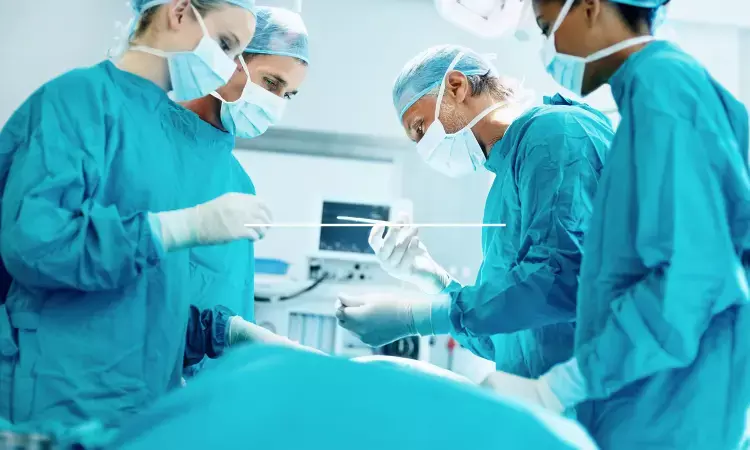- Home
- Medical news & Guidelines
- Anesthesiology
- Cardiology and CTVS
- Critical Care
- Dentistry
- Dermatology
- Diabetes and Endocrinology
- ENT
- Gastroenterology
- Medicine
- Nephrology
- Neurology
- Obstretics-Gynaecology
- Oncology
- Ophthalmology
- Orthopaedics
- Pediatrics-Neonatology
- Psychiatry
- Pulmonology
- Radiology
- Surgery
- Urology
- Laboratory Medicine
- Diet
- Nursing
- Paramedical
- Physiotherapy
- Health news
- Fact Check
- Bone Health Fact Check
- Brain Health Fact Check
- Cancer Related Fact Check
- Child Care Fact Check
- Dental and oral health fact check
- Diabetes and metabolic health fact check
- Diet and Nutrition Fact Check
- Eye and ENT Care Fact Check
- Fitness fact check
- Gut health fact check
- Heart health fact check
- Kidney health fact check
- Medical education fact check
- Men's health fact check
- Respiratory fact check
- Skin and hair care fact check
- Vaccine and Immunization fact check
- Women's health fact check
- AYUSH
- State News
- Andaman and Nicobar Islands
- Andhra Pradesh
- Arunachal Pradesh
- Assam
- Bihar
- Chandigarh
- Chattisgarh
- Dadra and Nagar Haveli
- Daman and Diu
- Delhi
- Goa
- Gujarat
- Haryana
- Himachal Pradesh
- Jammu & Kashmir
- Jharkhand
- Karnataka
- Kerala
- Ladakh
- Lakshadweep
- Madhya Pradesh
- Maharashtra
- Manipur
- Meghalaya
- Mizoram
- Nagaland
- Odisha
- Puducherry
- Punjab
- Rajasthan
- Sikkim
- Tamil Nadu
- Telangana
- Tripura
- Uttar Pradesh
- Uttrakhand
- West Bengal
- Medical Education
- Industry
Tubeless mini PCNL in kidney stone treatment ensures feasible stone-free rate, study shows

Taiwan: A totally tubeless single tract mini-percutaneous nephrolithotomy (PCNL) for treating large bursena>2 cm and/or complex renal stones ensures feasible stone-free rate (SFR), short hospital stay, and low morbidity shows a case series of 62 patients. Further, the totally tubeless manner was not tied to an increased risk of postoperative morbidity and decreased use of postoperative analgesics worked in favor of the patients. The study was published in the journal BMC Urology on 16 April 2022.
The use of totally tubeless mini-percutaneous nephrolithotomy for treating large renal stones is backed by limited literature. In the study, Pao-Hwa Chen, Department of General Surgery, Division of Urology, Changhua Christian Hospital, Changhua City, Taiwan, and colleagues present findings of treating patients with large and/or complex renal stones using single renal access totally tubeless mini-PCNL.
For this purpose, the researchers enrolled 62 consecutive cases, all with calculi > 2 cm, in which a single tract totally tubeless mini-PCNL was used to treat complex renal stones from March 2018 to May 2021. All procedure of puncture and dilation were guided by a fluoroscope. The Guy's Scoring System (GSS) was used to assess the complexity of stones. The surgical duration, perioperative morbidity, analgesia requirement, length of hospital stay, and stone-free rate were assessed.
The study led to the following findings:
· The mean preoperative stone burden was 36.69 ± 19.76 mm (above 2 cm in all cases), mean surgical duration was 61.93 ± 40.84 min (range 15–180 min), and mean hematocrit reduction was 4.67 ± 2.83%. Postoperative Nalbuphine was used in 6 patients.
· The mean length of stay was 2.46 ± 1.19 days, and the postoperative stone-free rate was 83.9% (52/62), and 87.1% (54/62) after auxiliary ESWL.
· The overall complication rate was 14.5%, the majority of complications being postoperative transient fever.
Reference:
Lin, CH., Lin, YC., Chiang, HC. et al. Totally tubeless single access tract mini-percutaneous nephrolithotripsy in treatment of large burden > 2-cm and/or complex renal stones: a case series of 62 patients. BMC Urol 22, 61 (2022). https://doi.org/10.1186/s12894-022-01012-9
Dr Kamal Kant Kohli-MBBS, DTCD- a chest specialist with more than 30 years of practice and a flair for writing clinical articles, Dr Kamal Kant Kohli joined Medical Dialogues as a Chief Editor of Medical News. Besides writing articles, as an editor, he proofreads and verifies all the medical content published on Medical Dialogues including those coming from journals, studies,medical conferences,guidelines etc. Email: drkohli@medicaldialogues.in. Contact no. 011-43720751


